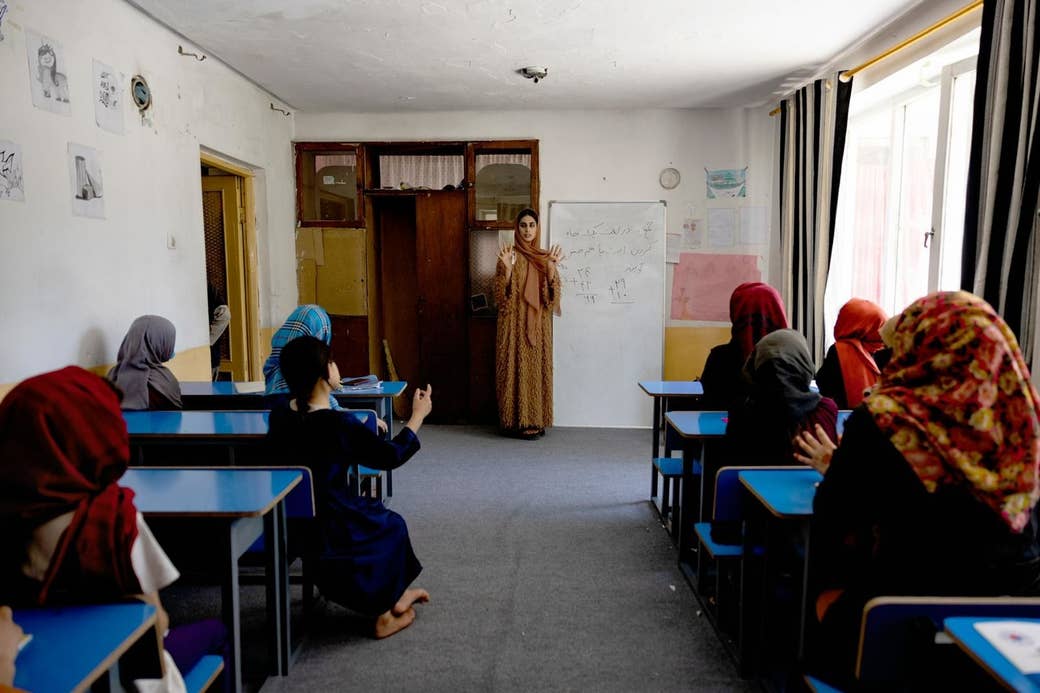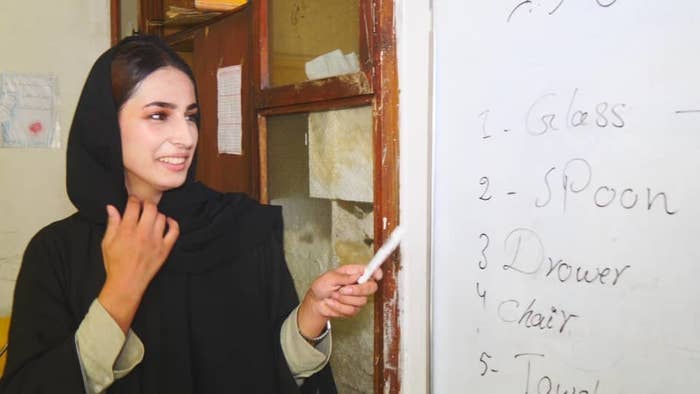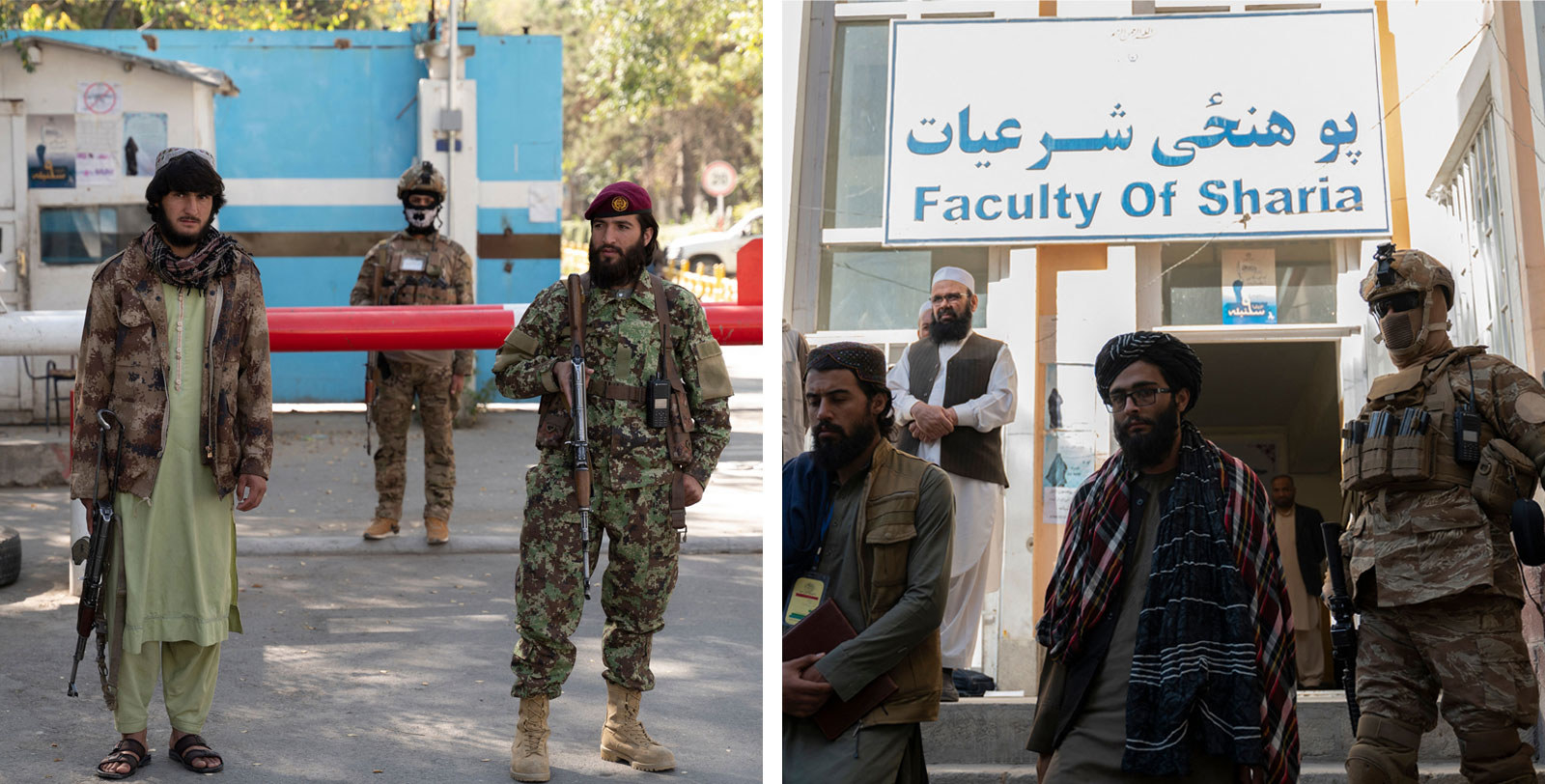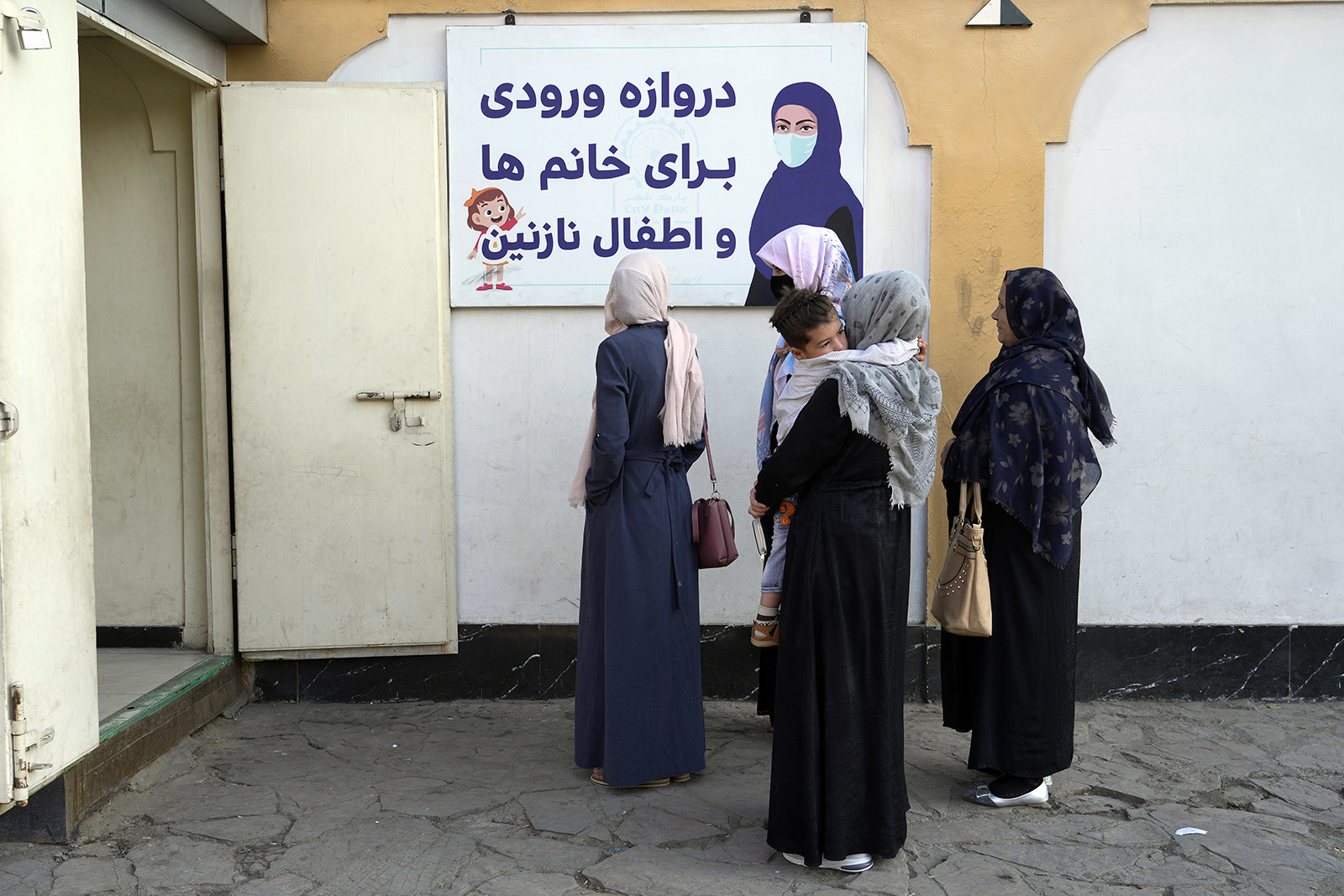
She was only able to put them off for so long until there she was, inside a police station in Kabul being interrogated by the Taliban. Sodaba Nazhand knew she had to be careful — not only was her personal safety at risk, but so was a clandestine operation she had started just months ago.
Nazhand’s operation involved something that wouldn’t typically be considered illegal: teaching. But she was secretly educating primary school–age girls and street children in defiance of the Taliban’s ban on educating girls beyond the sixth grade, which went into effect more than a year ago.
After three months of teaching a bunch of girls and street children in a nearby park in Kabul, Nazhand had put up a billboard in the area to encourage more students to enroll, which attracted the attention of the Taliban guards, who started interrogating her to find out what she was doing. Nazhand convinced them that she was offering religious lessons along with some basic education to street children.
It worked for a while. In the weeks that followed, her secret school for girls attracted more students, including the daughter of a Taliban commander from Kunduz province in northern Afghanistan who had never been able to go to school due to war and her father’s hardline ideology.
Eventually, though, she ended up at the police headquarters, where the Taliban guards interrogated her to find out if she was associated with any foreign nonprofit or agency.
“I told the Taliban that the class was only about educating street children,” Nazhand told BuzzFeed News. “Women or adult girls were coming only for religious education, not for school subjects.”
After she was released, Nazhand continued teaching in a park for three months before local volunteers found her a sheltered classroom area to combat harsh winter weather.

Now, the 21-year-old Kabul native whose educational aspirations were quashed by the Taliban’s takeover in August 2021 is teaching science and English courses to more than 100 girls beyond sixth grade, along with some street children.
That doesn’t mean Nazhand’s operation is endorsed by the Taliban. Guards ordered her to take her sign down. She had to ask her brother to maintain a daily presence at her classes to appease Taliban orders that a man be in charge. And the daughter of the Taliban commander has to take extreme measures to conceal her identity.
“She was never enrolled in school, but now she has found the opportunity to educate herself,” Nazhand said.
It has been more than 400 days since the Taliban announced that girls beyond grade six weren't allowed to go to school until the regime’s leaders make a longer-term decision, reviving memories of when the Taliban eroded rights and marginalized women from public life two decades ago.
The Taliban’s education ban and other policies regarding women has sparked strong condemnations by world leaders, including mainstream Islamic clerics. Even within the regime itself, there’s little unity around the ban. A few weeks ago, Taliban Deputy Minister of Foreign Affairs Sher Mohammad Abbas Stanikzai, who led peace negotiations with the US for over two years, criticized the closure of schools under the name of Islam and indirectly persuaded the hardline factions of the Taliban to reopen some campuses.
After the Taliban took over Afghanistan, there was some cautious optimism among residents when the new regime vowed during peace negotiations with the United States in summer 2021 that it would respect women’s rights and not implement restrictions on education for girls. Just months earlier, the US secretary of state and his Western counterparts issued a joint statement condemning the Taliban’s school ban.
On the first anniversary of the ban, United Nations Secretary-General António Guterres last month said that the past 12 months represented “a year of lost knowledge and opportunity that they will never get back.”

In July, the Taliban announced a meeting of handpicked clerics to decide on the fate of the education ban. But only two clerics came in support of the girls' education. Since then, the Taliban has not made any progress on whether they are willing to compromise
“Initially, we were hopeful that they would reopen schools, but with the passage of time, we noticed that, no, they are doing something else. They just issue anti-women verdicts after each day,” Nazhand said. “I don't think that they are willing to reopen schools, the Taliban don't have any problem with girls' schools, but they want to exploit them politically. They want to continue their ruling on society by banning girls schools. It is in their interest to impose restrictions on women because they can't do it on males.”
After the US military intervention of Afghanistan in late 2001 that ousted the Taliban from power, the war-torn country witnessed a series of socioeconomic reforms and rebuilding programs. The post-Taliban constitution, which was ratified in 2004, expanded women’s rights to go to school, vote, work, serve in civic institutions, and protest. By 2009, women were running for president for the first time in the country’s history.
But the four decades of war and hostility inflicted massive harm to Afghanistan’s basic infrastructures, including to the nation’s educational assets.
And even before the Taliban seized power on Aug. 15 last year, a report by UNICEF found that Afghanistan had struggled with more than 4.2 million children out of school, 60% of whom were girls. Although the potential costs of not educating boys and girls alike are high in terms of lost earnings, not educating girls is especially costly because of the relationship between educational attainment and student delaying marriage and childbearing, participating in the workforce, making choices about their own future, and investing more in the health and education of their own children later in life. The analysis indicates that Afghanistan will be unable to regain the GDP lost during the transition and reach its true potential productivity without fulfilling girls' rights to access and complete secondary school education. UNICEF also estimated that If the current cohort of 3 million girls were able to complete their secondary education and participate in the job market, it would contribute at least $5.4 billion to Afghanistan’s economy.
A report by Amnesty International also says that the Taliban have prevented women across Afghanistan from working.
“Most women government employees have been told to stay home, with the exception of those working in certain sectors such as health and education,” the report states. “In the private sector, many women have been dismissed from high-level positions. The Taliban’s policy appears to be that they will allow only women who cannot be replaced by men to keep working. Women who have continued working told Amnesty International that they are finding it extremely difficult in the face of Taliban restrictions on their clothing and behavior, such as the requirement for women doctors to avoid treating male patients or interacting with male colleagues.”
“Twenty years ago, when the Taliban took control of Afghanistan, the first thing they did was a ban on women’s access to education,” Nazhand said. “The Taliban kept a large number of women in isolation and as an illiterate population; the outcome was a paralyzed and backward society. We shouldn't forget that the Taliban are still suffering from the radical and repressive mindset that they would hold 20 years ago. We shouldn't remain the women that we were 20 years ago, and we will not remain silent.”
Security threats and acts of terrorism have also been a major concern to the students in Afghanistan. In late October, a suicide bomber attacked a class packed with over 500 students in west Kabul, killing at least 54 school graduates — among them were 54 young girls. The attack marked the second deadly attack on education centers in the country since the Taliban had taken over power.

The Taliban crackdown on Afghan women isn’t limited to banning schools for girls beyond grade six. After seizing power, the regime abolished the Afghan Ministry of Women’s Affairs and the Afghanistan Independent Human Rights Commission.
Earlier this month, in his first report to the Human Rights Council, Richard Bennett, UN special rapporteur on the situation of human rights in Afghanistan, cataloged human rights abuses under the Taliban since it seized control of the country in August 2021, including a severe rollback of the rights of women and girls, reprisals targeting opponents and critics, attacks on minorities including Hazara Shiites, and a clampdown on media.
“In no other country have women and girls so rapidly disappeared from all spheres of public life. Despite this, women and girls remain at the forefront of efforts to maintain human rights and continue to call for accountability,” Bennett wrote in the report to the UN Human Rights Council.
“Between 1996–2001 when the Taliban were in power, schools were closed to girls,” Bennett wrote. “Despite their pledge to allow all Afghan girls to return to school after 21 March 2022, they announced two days later that girls’ secondary schools would remain closed until policies and uniforms followed principles of Islamic law and Afghan culture. The Special Rapporteur notes with grave concern that this prohibits girls from attending secondary schools. Girls’ secondary schools are closed in 24 of 34 provinces, forcing about 850,000 girls from school.”
Nazhand said that, like her, all women in Afghanistan still look to the world to help them because they don't expect the Taliban will. “They don’t hear us,” she said. ●
